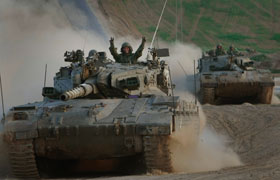Israeli soldiers ordered to ‘cleanse’ Gaza
 Alex Thomson
Chief Correspondent
Alex Thomson
Chief Correspondent
Israel’s invasion of Gaza deliberately aimed to “cleanse” Palestinian neighbourhoods, former soldiers allege, in claims that will reignite the debate over the campaign’s legality, writes Alex Thomson.

Israel’s controversial invasion of Gaza deliberately aimed to “cleanse” Palestinian neighbourhoods, former soldiers have alleged, in claims that will reignite the debate over the legality of the three week military campaign two years ago.
Israel invaded Gaza at the end of 2008 in a bid to halt rocket attacks from the territory it ceded in 2005. It says it focused on military targets controlled by Hamas, the Palestinian militant group, and bitterly countered a 2009 UN report that stated civilians had been deliberately targeted.
But in startling interviews with Israeli filmmaker Nurit Kedar for her film Concrete, former soldiers have for the first time allowed themselves to be named while blaming their commanders for encouraging a “disproportionate” response to Hamas’s rockets. They said their commanders used to “psych up” soldiers before an operation so they were ready to shoot indiscriminately.
One soldier says he was told to shell every house in a neighbourhood. Richard Goldstone’s report for the UN alleged that war crimes and possible crimes against humanity committed by both sides, but highlighted the moral and legal severity of the IDF’s attacks.
The IDF [Israel Defence Forces] has said its operational orders during the war emphasised “proportionality” and “humanity”. The importance of minimizing harm to civilians was made clear to soldiers, the IDF said at the time. By the end of the 22 day long operation some 1,400 Palestinians had been killed and large areas of Gaza razed. Ten Israeli soldiers and three Israeli civilians also died.
Soldier stories
In a report to be shown on Channel 4 News this week, 24-year-old tank commander Ohad remembers being told the night before the operation that the entry into Gaza was to be “disproportionate”. Once into Gaza, he says his orders were unambiguous:
“The order was very clear that if a car came within 200 metres of me I could simply shoot at it. Shoot a shell at it.”
Some of the most disputed claims about the operation centre around firing at family homes and mosques.
Ohad also says: “We needed to cleanse the neighbourhoods, the buildings, the area. It sounds really terrible to say “cleanse”, but those were the orders….I don’t want to make a mistake with the words.”
Thirty-year-old Shay who was in the Elite Combat Unit, still appears disturbed by taking over the house of a wealthy Palestinian family to fight Operation Cast Lead. He recalls being disgusted that Israeli conscripts had already defecated all over the bathroom of this family house. The family photos had been scrawled over. Graffiti was on the walls saying “long live Israel”.
“All the time we were there you could sense this family with us. Meaning they were there. All the clichés. There was a wooden rocking horse, I remember, you’d be on guard and next to you there’s a wooden rocking-horse,” Shay says.
Last year, the UN criticised Israel and Hamas for failing to adequately investigate the findings of its report.
Today, the Israeli Embassy said: “Over 12,000 rockets and shells rained down on Israeli civilians from Gaza forcing the IDF to carry out a military operation.
“Unlike much of the region, the open society within Israel allows for all allegations such as these to be aired and investigated. Israel has already authorised over 100 separate investigations into the operation, five broader investigations, and close to 50 criminal investigations are also taking place. Our judicial process is renowned across the world for its independence.”